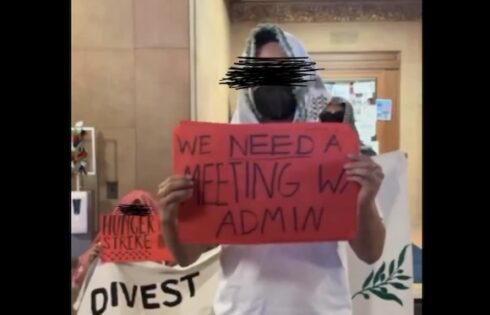
Mere ‘interpretive guidance’ then, and ‘something more’ now
When the Obama administration responded to critics of its Title IX framework – many of them politically progressive feminists – it claimed that the “guidance” ordering colleges to use a low evidence standard and deprive accused students of common due process protections was not legally binding.
Hence, the “Dear Colleague” letters didn’t require full regulatory rulemakings and couldn’t be challenged in court.
The national nonprofit Equal Means Equal is apparently not on the same page as its allies in the “believe the survivor” movement, because it filed a lawsuit against Education Secretary Betsy DeVos’s* new interim Title IX guidance on the grounds that the previous guidance was legally binding regulation.
Susan Kruth at the Foundation for Individual Rights in Education, which sponsored a lawsuit to overturn the previous guidance, has a good rundown of a handful of “especially disingenuous and troubling” claims in the new lawsuit, which was filed in federal court in Massachusetts.
First, a quick review of some major elements that replaced the Obama administration’s now-rescinded guidance: flexibility (but not a mandate) to use a higher evidence standard in sexual-misconduct proceedings and let one or both parties appeal rulings; a ban on gag orders and gender-stereotypical training materials; more specificity in the factual allegations underpinning charges; and required use of the same procedures for all disciplinary cases, sexual or not.
Only deluded rape-culture activists such as Equal Means Equal could object to these changes, but object they do, without the benefit of making a coherent legal case.
Kruth exposes the lie in the lawsuit’s claim that “the DeVos rules” impose different treatment for sexual misconduct cases than for others:
September [Education Department] documents focus on sexual misconduct cases because they are undoing the previous administration’s mandate that institutions treat those cases differently from other cases, including cases implicating other civil rights laws besides Title IX. The Q&A explicitly states that institutions should not treat sexual misconduct cases differently, stating: “When a school applies special procedures in sexual misconduct cases, it suggests a discriminatory purpose and should be avoided.”
She notes that only with the 2011 Dear Colleague letter did the department isolate sexual misconduct “for special treatment,” whereas the interim guidelines bring “rules for sex cases back in line with all other cases.”
Equal Means Equal’s claim that the DeVos rules, as it calls the surprising flexible interim guidance, violate the Administrative Procedure Act would be funny if it weren’t such a transparent lie.
The Obama administration’s entire legal defense of its Dear Colleague letters was that they weren’t legally binding, so they didn’t need to go through an APA rulemaking. It logically follows that the interim guidance doesn’t need to go through a rulemaking, either. Kruth says:
After six and a half years of ED and advocates for the 2011 Dear Colleague letter arguing that the letter did not constitute a violation of the APA because it was mere “interpretative guidance,” those same advocates are now turning around and arguing that it was something more.
ED’s September documents only rescind directives that were either unlawful to begin with or lawfully rescindable without procedure, by OCR’s own public statements.
Lawsuit challenges Department of Education’s rescission of 2011 ‘Dear Colleague’ letter: https://t.co/AoQHA7mHEZ
— FIRE (@TheFIREorg) October 24, 2017
One of the dumbest claims in the lawsuit is that the interim guidance somehow chills the speech of alleged victims by telling schools to treat students equally.
Though the lawsuit has three pseudonymous female plaintiffs with standing based on “pending [Office for Civil Rights] investigations or civil litigation under Title IX,” Equal Means Equal claims organizational standing because the DeVos rules have a “First Amendment chilling effect” on female students in general, who will “decline to report or seek redress” for Title IX grievances.
In keeping with the general incompetence of the rest of the lawsuit, Equal Means Equal misstates the conditions of the “chilling” test.
It’s worth quoting Kruth at length, because this may be the likeliest avenue for the court to dismiss Equal Means Equal as a plaintiff for lack of standing:
Free speech cases do enjoy relaxed standing requirements, but it’s not accurate to say they require only that speech be subjectively chilled. The government has not in any way demonstrated an intent to punish complainants for good-faith reports of harassment or assault, and the Supreme Court has explicitly stated that “[a]llegations of a subjective ‘chill’ are not an adequate substitute for [the] claim of specific present objective harm or a threat of specific future harm” normally required for a successful lawsuit.
A pledge to respect the due process rights of respondents cannot reasonably be interpreted as an unconstitutional hindrance to speech about alleged wrongdoing. If it could, surely the same First Amendment claim could be made with respect to the many procedural safeguards criminal defendants enjoy, like the right to an attorney, the right to question witnesses, and the right to be presumed innocent until proven guilty beyond a reasonable doubt. Yet no court would find that an affirmation of these essential elements of fair trials violates the First Amendment just because they may result in victims’ hesitance to come forward, at the risk that their cases might not succeed.
The lawyer behind the lawsuit is, not surprisingly, the New England School of Law’s Wendy Murphy, who teaches sexual-violence law but doesn’t seem to know that Title IX is bound by Supreme Court precedent (she’s not the only one).
She was identified by The Campus Rape Frenzy co-author KC Johnson in 2012 for her “almost cheerful willingness” to presume guilt in campus sexual misconduct cases. Murphy is also on the record opposing New York’s affirmative-consent law for campus sex because she says it undercuts Title IX’s ban on subjectively “unwelcome” conduct.
That supposed condition appears nowhere in the text of or regulations implementing Title IX, but only – you guessed it – in an Obama administration “blueprint” document for colleges.
MORE: Public university says Title IX trumps the Constitution
IMAGE: Chisel Wright/Flickr
Like The College Fix on Facebook / Follow us on Twitter







Please join the conversation about our stories on Facebook, Twitter, Instagram, Reddit, MeWe, Rumble, Gab, Minds and Gettr.